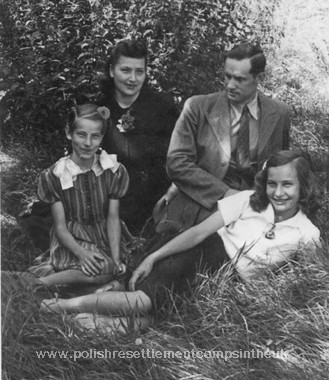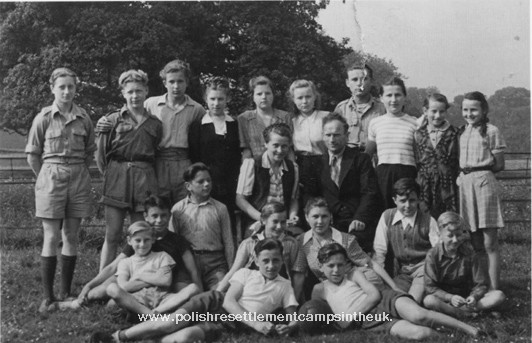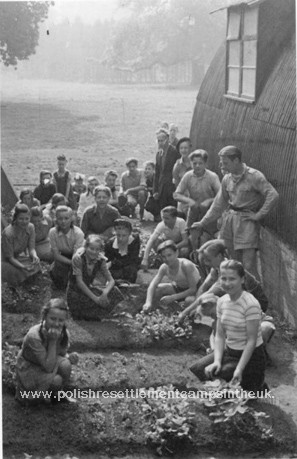|
MY JOURNEY
FROM POLAND TO DODDINGTON by Barbara AUER |
|
| |
|
My Father's family came
from Warsaw, my Mother Agnieszka from
the Nałęczów
region and both my sister Hania and I were born in Warsaw. However,
we grew
up on a state owned farm near Mińsk Mazowiecki where my father
Michał was employed as an
Agronomist. |
| |
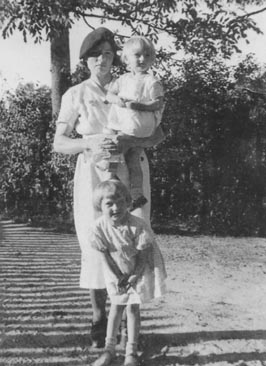 |
|
My aunt Maria with me and Hania in Mienia
Poland 1937 |
|
|
At the outbreak of World War 2, like all men of military
age, he was called up to serve in the army. The Military Police unit
in which he served was overwhelmed by the German blitzkrieg and he was taken
prisoner. |
| |
|
Without father to support
us, we returned to Warsaw to stay with an uncle and aunt.
When the Warsaw rising became imminent
our mother took us
to Częstochowa, where
my father's sister lived. We didn't know this at the time, but her husband
and two teenaged sons were in the underground army and the house was under
surveillance by the Germans. Soon the entire household was arrested
and deported to labour camps in Germany. Once in Germany we tried to
discover where our dad was and it turned out that he was working in an
ammunition factory not far from our camp. The allied campaign was
forcing the Germans to relocate their industry and the work force further
from the front so both our labour camp and the ammunition factory in which
dad was working were relocated to Austria. |
| |
|
We met up with our Dad in Austria and were together when
the war ended in May 1945. Initially we were looked after by the
British army but within a few weeks Gen. Anders' 2nd. Corps provided
transport to evacuate us to the Polish camp in Trani, not far from the
port town of Ancona in Italy. |
| |
|
The camp in Trani, situated on the beautiful Adriatic coast,
was set up by the Polish 2nd. Corps to care for Polish Displaced
Persons evacuated from Austria and Germany. After the hardships,
fear, brutality and constant danger that we endured during the five years
of war, Trani was like a different world. Many of us saw the sea
for the first time and learned to swim in the warm waters of the Adriatic. The camp had a fully
equipped hospital which cared not only for Polish soldiers
but for all those living in the camp. |
|
|
| |
| Whilst in the camp I was taken ill
and remember seeing Gen. Anders when he came to visit the children in Trani hospital.
We had been in Italy for about a year when we were told that we are going to
England. |
| |
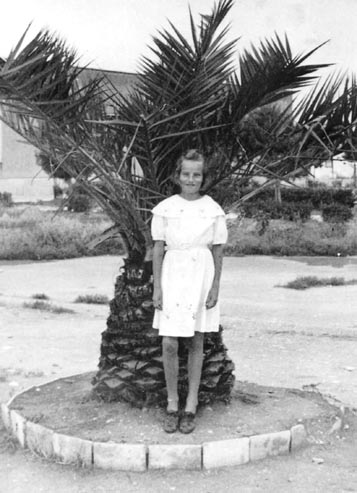 |
|
Basia Auer in Trani.1946 |
|
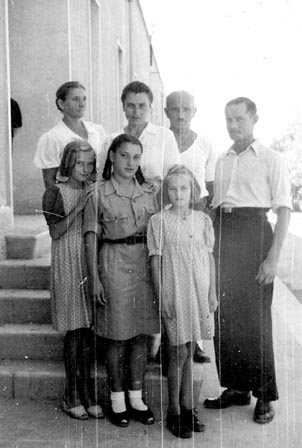 |
|
My father and I are on the right Hania on
the left and my mother second from the left, with friends in
Trani. 1946 |
|
|
| |
|
On the 24th of September 1946 my mother, sister Hania and I with about 800
other D.Ps. left Trani camp and travelled by train to
Naples. The next day we boarded the Hospital ship "Andes" and left Italy
the same day. The ship was well equipped and the captain and crew looked
after us very well, the weather was fine except for one day. We arrived
in Southampton at 8 a.m. on the 30th. of September where we were organised into groups and
dispatched to our allocated camps. Our group of about 270 women and
children travelled by train to a camp near Leominster, after a short stay
we moved to Doddington camp. |
| |
|
Our father, who worked in administration
in Trani, joined us some time later. |
|
|
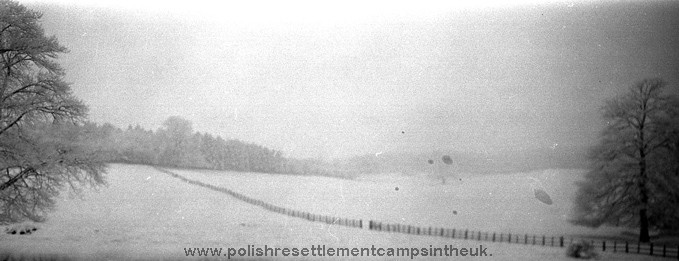 |
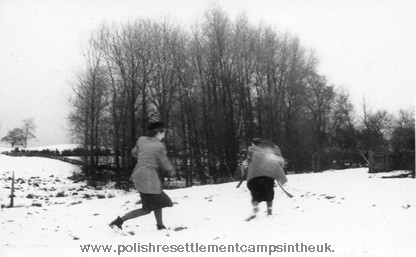 |
|
Winter 1947/8 |
Basia and Hania having a snowball fight 1950 |
|
|
|
|
We arrived in Doddington some time in November 1946 and my
abiding memory is of the long and severe winter of 1946/7 which, after the warmth of Italy, was a bit of a shock but never the less great
fun for us children. I believe it was the snowiest
winter of the 20th Century and is widely believed to be the snowiest
winter since 1813/14. The winter
struck at a time when the country was recovering from the aftermath of
World War II and many essential items were rationed. |
|
|
|
|
| Photo is of our mother, father, my sister Hania and me in Doddington |
| |
|
As the army camp had not yet been converted to family
living, there were no cooking facilities and our meals were prepared
and served communally.
When our father arrived from Italy, we moved to better accommodation
within the camp, had our ration book returned and started
fending for ourselves. |
| |
|
Our barrack was the last on the road leading to the
residence of Sir Evelyn Delves Broughton, on who's estate the
camp was built. Frequently he would stop for a chat, of course at
that time we did not know his family's tragic history, which was revealed
much later in the film "White Mischief". |
| |
|
Life in the camp was hard, specially for the older
generation. Not knowing the language was a big set back and
finding suitable work was not easy. Our parents were quite lucky, mother worked in the camp creche,
looking after small children whose mothers worked in the Potteries and
father initially worked at the camp stores and later at Crewe
Works which was the main employer in the area. Evening language
classes were provided by the camps authorities. |
| |
|
There was a Polish Infant and
Junior school in the camp which my sister and I attended for
about a year, but there was no Polish Secondary School in the camp
so when I became twelve I went to an English school in Wybunbury, a village a
few miles away from the camp. |
|
|
|
|
|
For the first few months I struggled with my English. At
the age of 15 I left school but continued my education in a
secretarial school in Crewe, and later got a job as a shorthand typist.
|
|
|
|
On the right - Tending the school
allotment |
|
Below - Children from the Polish school. I am
standing second from the right. |
|
|
|
|
|
|
|
|
As teenagers, life in the camp was good. I
had a lot of friends and there was always something going on. I was in the
Polish girl guides, in the dance group and in the choir. The summers were
the best when the boys who were away in
Diddington Park
school came home for the holidays. |
|
|
|
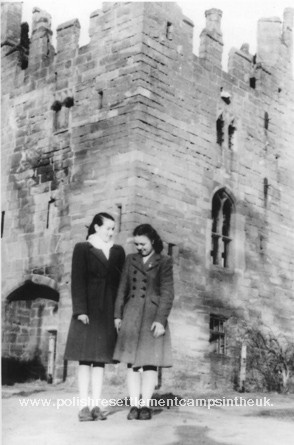 |
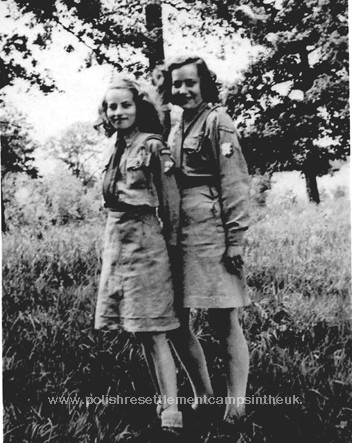 |
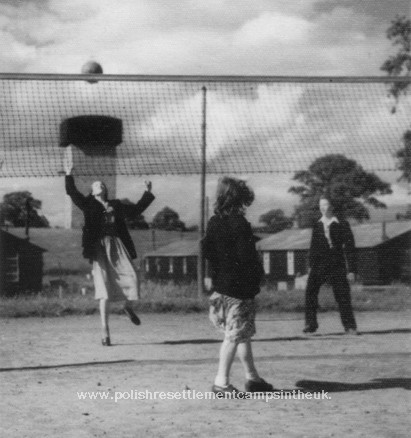 |
|
Basia Łęcka and Basia Auer by
the tower. |
Basia and sister Hania in their girl guide
uniforms. |
Playing volleyball with some Diddington boys
|
|
|
|
|
A celebration of the Polish day of Independence
with General Anders - 19/11/1950 |
|
I met Gen. Anders for the
first time in 1945 while in Hospital in Trani. I met him again
in 1950 when he made one of his historic visits to Doddington.
|
|
|
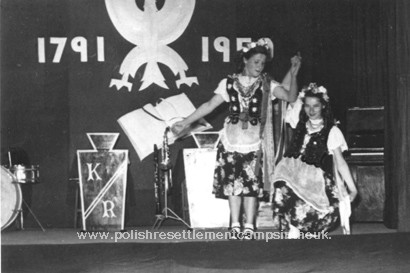 |
|
Above;-Kazia Michniewicz and Basia Auer
Below:- Basia Auer, Klara Grycewicz, Urszula
Łyszczucka, Leonia? |
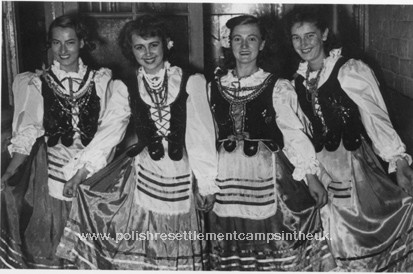 |
|
|
He came with Poland's President
in Exile August Zaleski, Senior Prelate Bronisław Michalski and Prince Eugeniusz Lubomirski A.D.C. to President Zaleski. |
| |
|
The distinguished guests
arrived at 11a.m. and were greeted by the Educational
Organiser, Mr. Czapliński, in the name of all Poles who had assembled.
They came not only from Doddington but also from the Manchester area,
the Polish camp at Delamere Park in Cheshire and as far afield as
Wheaton Aston camp in Staffordshire. He greeted the party with
the symbolic welcome of bread and salt and addressed the
President expressing the hope that all Poles will soon be united
in a free Poland. |
| |
|
A mass was celebrated by
Prelete Michalski and Fr. Tadeusz Urbański, priest at Doddington camp.
There followed a visit to the small Polish school, where the
General was greeted by girls in National dress and boys in
army uniform displaying badges of the 27th. Polish
regiment. Lunch was followed by a concert and speeches. Gen.
Anders spoke for some 30 minutes praising the work of parents
and teachers in instilling Polish culture and spirit into the
next generation and expressing his firm belief that this
generation will live to see an independent Poland. It was a
very memorable occasion. |
|
|
General Władysław Anders giving
his address. |
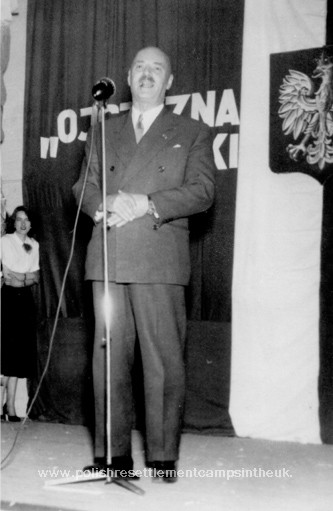 |
|
I was standing in the wings listening to the
General's speech when one of my friends pushed me out onto the
stage. |
|
|
|
|
|
In 1954 my family Left Doddington and we moved to London,
where I met my future husband Feliks Dziadulewicz , who left
Babdown camp the
same year. We married in 1960, have two children and one granddaughter,
born in Bath in 1997. We moved to Bath in 2002 to be close to our
children. Feliks died in
2010 but I am left with happy memories of our 50 years together. |
|
|
|
|
|
|





